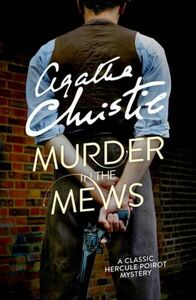You need to sign in or sign up before continuing.
Take a photo of a barcode or cover
challenging
mysterious
reflective
fast-paced
Plot or Character Driven:
Plot
Strong character development:
No
Loveable characters:
No
Diverse cast of characters:
No
Flaws of characters a main focus:
No
mysterious
medium-paced
Plot or Character Driven:
Plot
Strong character development:
No
Diverse cast of characters:
No
Flaws of characters a main focus:
No
Very enjoyable Poirot stories for the most part. The first was my favorite, the second my least favorite. The second book is very focused on political spy stuff, which I find boring. I almost just skipped it, but then it got to the mystery part of it. The others were more mystery focused and had good plot twists.
Four little Poirot mysteries, three deaths and a theft. Beautifully constructed and enacted with surprising, but not always satisfying, conclusions. Needless to say, I was completely bamboozled at every turn!
adventurous
challenging
mysterious
tense
slow-paced
Plot or Character Driven:
Plot
Strong character development:
No
Diverse cast of characters:
No
Flaws of characters a main focus:
No
I love Agatha Christie, but this somehow just wasn’t it for me, I loved the first novella though
adventurous
dark
mysterious
fast-paced
Plot or Character Driven:
Plot
Strong character development:
No
Loveable characters:
No
Diverse cast of characters:
No
Flaws of characters a main focus:
Complicated
mysterious
medium-paced
mysterious
fast-paced
Plot or Character Driven:
Plot
Strong character development:
No
Loveable characters:
N/A
Diverse cast of characters:
No
Flaws of characters a main focus:
No
A collection of four short stories featuring Hercule Poirot: two locked-room, apparent suicides, a WWII theft of government secrets, and a love triangle on a Greek vacation. All of them are decent, but a bit melodramatic. I prefer Dame Christie's novels where I can wrap my brain around all the characters and clues.
"Dead Man's Mirror": Poirot is summoned via letter by Sir Gervase Chevenix-Gore, but when he arrives at dinner time, the man is dead by apparent suicide in his locked office. The last of the Chevenix-Gores, he was a domineering snob, but he didn't seem to have a reason to kill himself. Is there a killer within his closest friends, family, or staff?
Solution: The murderer was the woman helping him write his family history. She's actually the mother of Sir Gervase's adopted daughter, who was actually his dead brother's illegitimate child. Got that? She did it to save her daughter from being forced to marry her cousin or be disinherited. (Cousin would have been required to change his last name, all so the C-G name wouldn't die out.)
"The Incredible Theft": Would you invite a known spy to your home to tempt her to steal secret military documents? That's what Lord Mayfield, Minister of Armaments, claims he's done and then, oopsy, the plans actually disappear and it doesn't look like she could be the thief. Mayfield's old friend, Sir George Carrington, head of the Air Force, calls in Poirot to investigate on the DL.
Solution:
"Murder in the Mews": Another apparent suicide in a locked room. This time it's a young widow who lives near Poirot. Chief Inspector Japp pulls Poirot in to investigate some suspicious details. Recently engaged, she has no apparent reason to kill herself. And who was the older man who visited her the night of her death?
Solution:
"Triangle at Rhodes": On vacation, Poirot is witness to an apparent love triangle that ends in murder. At only 25 pages, this one is short and sweet.
Solution:
"Dead Man's Mirror": Poirot is summoned via letter by Sir Gervase Chevenix-Gore, but when he arrives at dinner time, the man is dead by apparent suicide in his locked office. The last of the Chevenix-Gores, he was a domineering snob, but he didn't seem to have a reason to kill himself. Is there a killer within his closest friends, family, or staff?
Solution:
"The Incredible Theft": Would you invite a known spy to your home to tempt her to steal secret military documents? That's what Lord Mayfield, Minister of Armaments, claims he's done and then, oopsy, the plans actually disappear and it doesn't look like she could be the thief. Mayfield's old friend, Sir George Carrington, head of the Air Force, calls in Poirot to investigate on the DL.
Solution:
Spoiler
Lord Mayfield pocketed the docs himself (altered to be useless) and traded them with Mrs. Vanderlyn (the spy) for a letter that incriminated him for possibly being a former Nazi supporter. (I think that's what Christie is implying. It reminded me a little of [b:The Remains of the Day|28921|The Remains of the Day|Kazuo Ishiguro|https://i.gr-assets.com/images/S/compressed.photo.goodreads.com/books/1327128714l/28921._SY75_.jpg|3333111] in that respect.)"Murder in the Mews": Another apparent suicide in a locked room. This time it's a young widow who lives near Poirot. Chief Inspector Japp pulls Poirot in to investigate some suspicious details. Recently engaged, she has no apparent reason to kill herself. And who was the older man who visited her the night of her death?
Solution:
Spoiler
This time it actually was suicide, because she was being black-mailed for being an unwed mum. (The child died.) Her roommate found the body and then tried to make it look like she'd been murdered by her blackmailer."Triangle at Rhodes": On vacation, Poirot is witness to an apparent love triangle that ends in murder. At only 25 pages, this one is short and sweet.
Solution:
Spoiler
While it looks like Douglas Gold accidentally poisoned his lover, the glamorous Valentine Chantry, in a botched attempt at poisoning her husband... Actually, Commander Chantry purposely poisoned his own wife to frame Douglas, so he could be with Marjorie Gold, who isn't as sweet and innocent as she seems.Even though the first two stories weren't to my taste, I liked this collection so much better than the first one, maybe because there weren't a billion of them this time.
Murder in the Mews - 2.5/5 - Once again Poirot is a huge judgmental pedant.
The Incredible Theft - 2/5 - Incredibly dull
Dead Man's Mirror - 4.5/5 - I really liked that one, though I do think that the very last bit (sparing the murderer a murder trial by waving "heart disease" around) was convenient
Triangle at Rhodes - 3/5 - Kind of interesting, though I wish it had been longer so as to develop the characters a little more.
The Incredible Theft - 2/5 - Incredibly dull
Dead Man's Mirror - 4.5/5 - I really liked that one, though I do think that the very last bit (sparing the murderer a murder trial by waving "heart disease" around) was convenient
Triangle at Rhodes - 3/5 - Kind of interesting, though I wish it had been longer so as to develop the characters a little more.
3 1/2 stars
I really enjoyed this collection of four novellas with Poirot leading each investigation. The tighter structure required Christie to get Poirot on the job from the start, and that was very satisfying to this Poirot fan.
I really enjoyed this collection of four novellas with Poirot leading each investigation. The tighter structure required Christie to get Poirot on the job from the start, and that was very satisfying to this Poirot fan.






